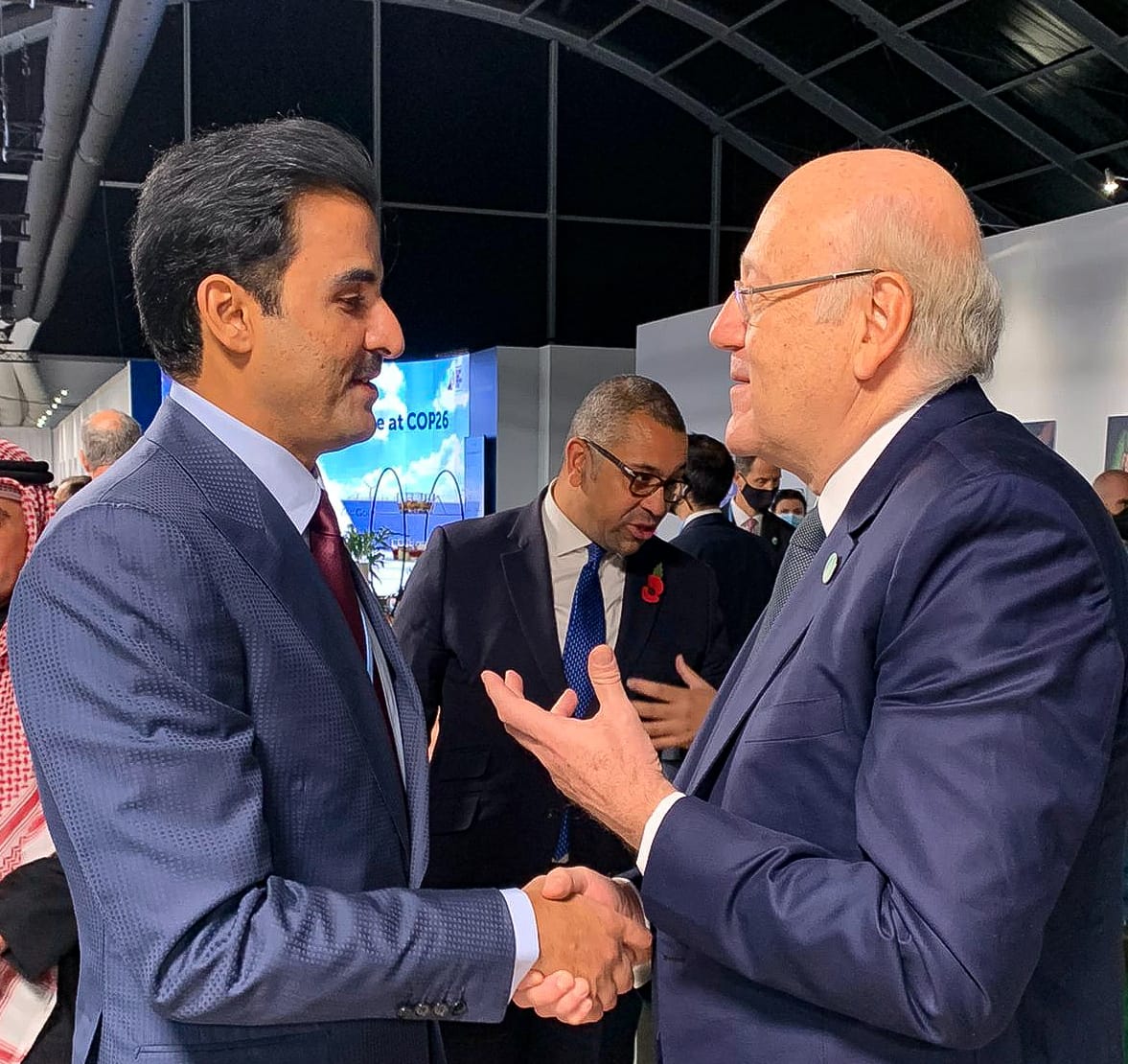The Lebanese official met with Qatar and Kuwait in Glasgow amid tensions in the region.
Lebanon’s Prime Minister Najib Mikati met with Qatar’s Amir Sheikh Tamim bin Hamad al-Thani in Glasgow on Monday, an official source said, as an ongoing dispute continues to rage on.
“During the meeting, Qatar’s amir said he will send Qatari Foreign Minister Sheikh Mohammed Bin Abdulrahman Al Thani to Beirut soon,” the Lebanese Prime Minister’s office said in a statement on Monday.
https://twitter.com/grandserail/status/1455168358031269894
Mikati met with Sheikh Tamim on the sidelines of the United Nation’s COP26 climate summit to discuss ways to mediate between Lebanon and the GCC amid rising tensions in the region that were sparked by criticism over the Yemen war.
Tensions ignited last week after comments made by now Minister of Information George Kordahi resurfaced online. Ahead of his appointment as a government official, Kordahi criticised the Saudi-led coalition’s military intervention in Yemen, describing the war as “futile” and saying it is “about time for it to end.”
He added that Yemen’s Houthi rebels, who overran the capital and pushed out the internationally-recognised government in 2014, were “defending themselves… against external aggression.”
Kordahi added that “homes, villages, funerals and weddings were being bombed” by the Saudi-led coalition.
Despite sharing his opinions as a civilian at the time, the now-resurfaced remarks have triggered fury across the Gulf Cooperation Council that has quickly transformed into a diplomatic rift between the bloc and Beirut.
Saudi Arabia along with Bahrain, the United Arab Emirates, and Kuwait took joint action in expelling their Lebanon envoys and withdrawing their ambassadors from Beirut.
Riyadh has even imposed a ban on trade with Lebanon, while the UAE banned its citizens from traveling to the country.
During the meeting on Monday, the Lebanese official thanked Sheikh Tamim for his “continuous support of Lebanon.”
Mikati also met with Kuwait’s PM Sheikh Sabah al-Khalid al-Sabah and Foreign Minister Ahmad Nasser Al-Mohammad al-Sabah. While Qatar condemned Kordahi’s “irresponsible” comments, Kuwait took further action against Lebanon by pulling its envoy.
https://twitter.com/grandserail/status/1455168370341466114
Speaking to the Kuwaiti officials, Mikati stressed “Lebanon’s keenness to maintain a close relationship with the Gulf Cooperation Council countries and to work on addressing any gaps in the spirit of brotherhood and cooperation.”
Meanwhile, “Sheikh Sabah stressed on Kuwait’s keenness to support Lebanon in all aspects while maintaining the unity of GCC countries,” the office said.
“Lebanon is capable, with its wisdom, to address any problem or loophole, and it will find all the required support from Kuwait and other Arab countries,” the statement added.
Read also: Crisis-stricken Lebanon faces GCC fury over Yemen war criticism
The Lebanese PM has tried to contain a diplomatic rift early on by rejecting Kordahi’s comments, stressing that they do not represent the government’s position.
While Saudi Arabia’s influence in the region has threatened the-newly appointed government in Beirut, Lebanon’s Foreign Minister Abdallah bou Habib said other world powers have stood behind the ruling authority.
“We do not understand the harshness of the Saudi side and issues between any two countries should be resolved through dialogue,” the minister said in a statement on the Al Jadeed programme on Sunday.
“The government is staying, and according to what I have heard from Aoun and Mikati, there is an international reassurance supporting the new government,” he added.
Earlier reports suggested the Lebanese government has yet to officially ask Kordahi to submit his resignation. However, Kordahi reportedly offered his resignation to Sleiman Tony Frangieh, the current leader of the Marada Movement.
Frangieh said he refused the proposal because “he did nothing wrong”.
This was later confirmed by Kordahi who on Sunday said resigning was “out of the question”, insisting that his comments were personal views shared before becoming a cabinet member.
‘Symptom of reality’
Saudi prince Farhan admitted before that the recent attack on Lebanon was not only triggered by Kordahi’s remarks, but also a reaction to Hezbollah’s presence and influence in the country.
He told CNBC on Saturday that Kordahi’s statements “are a symptom of a reality – a reality that the political scene in Lebanon continues to be dominated by Hezbollah.
“For us, it is broader than just the comments of one minister. It is more an indication of the state that Lebanon is in,” he said.
On Tuesday, Lebanese newspaper Al Joumhouria cited Lebanese officials that claimed the government holds Kordahi accountable for the Gulf crisis, adding that “he has to understand the seriousness of the issue.”
Sources told the paper that Kordahi has “to initiate and withdraw from the government to facilitate mediation efforts with Saudi Arabia and restore ties.”
It added that “in case Kordahi refrains from taking the expected decision, it is very possible that some ministers will resign from the government,” which means the government will fall apart.







